山东省济宁市任城区2015-2016学年高中二年级英语下学期期中试题
高中英语真题:2015-2016学年度下学期高二英语期中考试
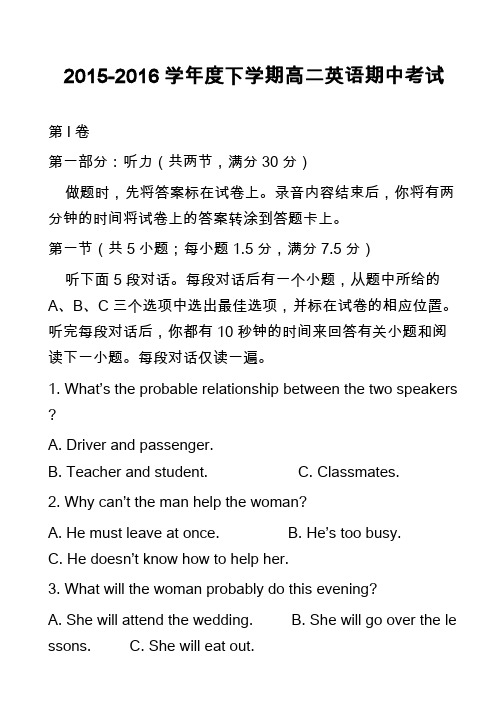
2015-2016学年度下学期高二英语期中考试第I卷第一部分:听力(共两节,满分30分)做题时,先将答案标在试卷上。
录音内容结束后,你将有两分钟的时间将试卷上的答案转涂到答题卡上。
第一节(共5小题;每小题1.5分,满分7.5分)听下面5段对话。
每段对话后有一个小题,从题中所给的A、B、C三个选项中选出最佳选项,并标在试卷的相应位置。
听完每段对话后,你都有10秒钟的时间来回答有关小题和阅读下一小题。
每段对话仅读一遍。
1. What’s the probable relationship between the two speakers ?A. Driver and passenger.B. Teacher and student.C. Classmates.2. Why can’t the man help the woman?A. He must leave at once.B. He’s too busy.C. He doesn’t know how to help her.3. What will the woman probably do this evening?A. She will attend the wedding.B. She will go over the le ssons.C. She will eat out.4. What does the man reply?A. Karen is very forgetful.B. He knows Karen better no w.C. Karen is sure to pass the interview.5. What are the speakers doing?A. Riding a horse.B. Shooting a movie.C. Taking a photo.第二节(共15小题;每小题1.5分,满分22.5分)听下面5段对话或独白。
2015-2016学年第二学期高二期中考试英语学科试题及参考答案
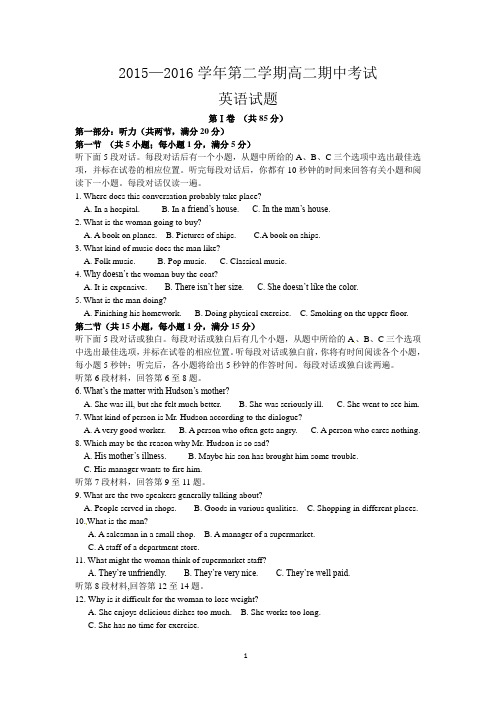
2015—2016学年第二学期高二期中考试英语试题第Ⅰ卷(共85分)第一部分:听力(共两节,满分20分)第一节(共5小题;每小题1分,满分5分)听下面5段对话。
每段对话后有一个小题,从题中所给的A、B、C三个选项中选出最佳选项,并标在试卷的相应位置。
听完每段对话后,你都有10秒钟的时间来回答有关小题和阅读下一小题。
每段对话仅读一遍。
1. Where does this conversation probably take place?A. In a hospital.B. In a friend‟s house.C. In the man‟s house.2. What is the woman going to buy?A. A book on planes.B. Pictures of ships.C.A book on ships.3. What kind of music does the man like?A. Folk music.B. Pop music.C. Classical music.4. Why doesn‟t the woman buy the coat?A. It is expensive.B. There isn‟t her size.C. She doesn‟t like the color.5. What is the man doing?A. Finishing his homework.B. Doing physical exercise.C. Smoking on the upper floor.第二节(共15小题,每小题1分,满分15分)听下面5段对话或独白。
每段对话或独白后有几个小题,从题中所给的A、B、C三个选项中选出最佳选项,并标在试卷的相应位置。
听每段对话或独白前,你将有时间阅读各个小题,每小题5秒钟;听完后,各小题将给出5秒钟的作答时间。
每段对话或独白读两遍。
高中英语真题:2015-2016学年度第二学期期中考试
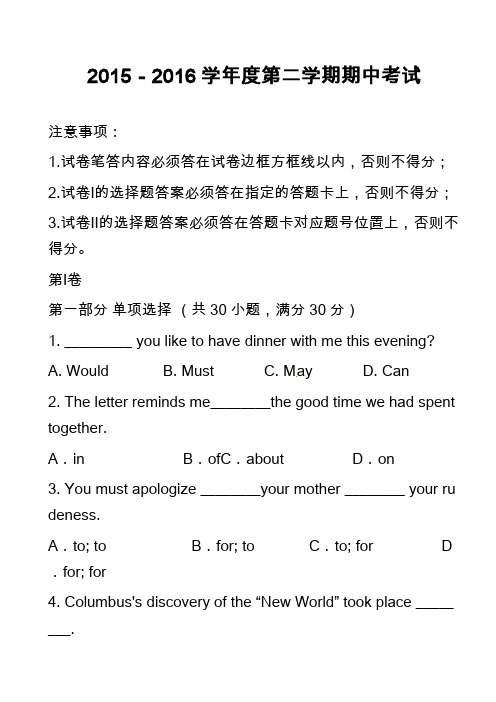
2015-2016学年度第二学期期中考试注意事项:1.试卷笔答内容必须答在试卷边框方框线以内,否则不得分;2.试卷Ⅰ的选择题答案必须答在指定的答题卡上,否则不得分;3.试卷Ⅱ的选择题答案必须答在答题卡对应题号位置上,否则不得分。
第Ⅰ卷第一部分单项选择(共30小题,满分30分)1. _________ you like to have dinner with me this evening?A. WouldB. MustC. MayD. Can2. The letter reminds me________the good time we had spent together.A.in B.ofC.about D.on3. You must apologize ________your mother ________ your ru deness.A.to; to B.for; to C.to; for D .for; for4. Columbus's discovery of the “New World” took place _____ ___.A. on purposeB. by accidentC. by heartD. by mistake5.--- May I ask you a question?--- Of course. _____________A.Go ahead B.Good luck C.All the best D.Cheer up6. —Would you like some more chicken?—No, thanks. I'm ________a diet and I'm trying to ________ weig ht.A.on; lose B. on; put onC. in; have D. in; lose7. Humans __________________ polluting nature.A. ought to have stoppedB. ought to be stoppingC. ought to stopD. ought have stopped8. If you cheat in the exam, you could hardly ________ it.A. throw awayB. get awayC. get away fromD. get away with9. It's wrong for us to play tricks ________our parents. A.with B.onC.to D.at10. She could not _________ for her mistake.A.account B.permit C.exist D.consult11. He _____________ the girl, trying to remember who she w as.A.stare at B.stared at C.glare at D.glance at12. He was ____________ by his grandparents and educated at a local school.A.cheer up B.dressed up C.turned up D.bro ught up13. Some films ______ education with recreation. A.combine B.pull C.admire D .seek14. He is said to be very wealthy, but I don't understand why he is always ________.A. in debtsB. in fashionC. in memoryD. in ra gs15. I will never forget the day _________ we spent together.A. whenB. thatC. whatD. as16. ---When will the meeting ________? ---At about 11o’clock.A. break upB. break downC. break outD. brea k into17. The stamps were _________ according to their styles and f eatures.A. found outB. sorted outC. put outD. taken out18. If people continue to destroy the rainforests, many rare an imals will surely______ in the future.A. die offB. give outC. die outD. run out19. The commercial center __________ in the late 1870s.A. came fromB. came overC. came into beingD. c ame out20. ---Would you permit me _________ here?---Sorry. We don’t permit ________ here in the reading room. A. smoking; smoking B. to smoke; to smokeC. smoking; to smokeD. to smoke; smoking21. He __________ the big tree to make some tables.A. cut outB. cut upC. cut offD. cut down22.--- Must I finish the work today?--- No, you ____________.A. needn’tB. mustn’tC. can’tD. oughtn’t to23. It was _________ that Gina was lying.A. religiousB. rawC. obviousD. indeedputers ___________ in offices and homes since 1970s.A. have been usedB. have usedC. were being usedD. used25. ---His girl friend deserted him because of his taking drugs. --He is doing what he could to _________ her love.A. win overB. win backC. win throughD. win out26. It’s possible to hold one’s _______ for three minutes, with practice.A. breathsB. breathC. breatheD. breathed27. They were searching for a way to ________ people in public life from gunfire.A. protectB. seekC. huntD. gather28. We are looking forward to __________ from you soon.A. hearB. heardC. hearingD. be heard29. The train ___________ he is travelling is arriving.A. by whichB. whatC. whichD. that30. I congratulate my neighbor, _________ son has just won the election.A. whoB. whomC. whoseD. that第二部分阅读理解(共两节,满分40分)第一节(共15小题;每小题2分,满分30分)阅读下列短文,从每题所给的四个选项(A、B、C和D)中,选出最佳选项并在答题卡上将该项涂黑。
2015-2016学年高二英语下学期期中试题

2015-2016学年高二英语下学期期中试题本试卷分第I卷(选择题)和第II卷(非选择题)。
满分100分,考试时间120分钟。
第I卷注意事项:答第I卷前, 务必将自己的姓名、准考证号、考试科目涂写在答题卡上。
每小题选出答案后,用铅笔把答题卡上对应题目的答案标号涂黑。
如需改动,用橡皮擦干净后,再选涂其它答案标号。
不能答在试卷上,否则无效。
第一部分听力(共两节,满分15分)第一节(共5小题;每小题1分,满分5分)听下面5段对话。
每段对话后有一个小题,从题中所给的A、B、C三个选项中选出最佳选项,并标在试卷的相应位置。
听完每段对话后,你都有10秒钟的时间来回答有关小题和阅读下一小题。
每段对话仅读一遍。
1. What are the speakers talking about?A. Who will attend the meeting.B. When to announce the news.C. What to discuss on Wednesday.2. What will the man do?A. Have a cup of tea.B. Make tea for Christine.C. Boil more water.3. Why is Sheila late?A. She argued with her boss.B. She forgot the time.C. She had to finish work.4. What is the weather normally like?A. Warm.B. Rainy.C. Cold.5. What does the man mean?A. He likes his professor.B. He needs more time.C. H e wants a new task.第二节(共10小题;每小题1分,满分10分)听下面4段对话。
2015-2016学年高二下学期期中考试英语试题
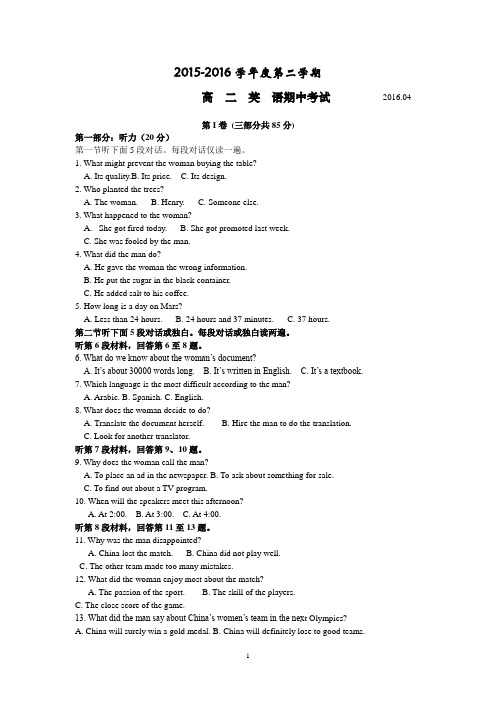
2015-2016学年度第二学期高二英语期中考试2016.04第I卷(三部分共85分)第一部分:听力(20分)第一节听下面5段对话。
每段对话仅读一遍。
1. What might prevent the woman buying the table?A. Its quality.B. Its price.C. Its design.2. Who planted the trees?A. The woman.B. Henry.C. Someone else.3. What happened to the woman?A.She got fired today.B. She got promoted last week.C. She was fooled by the man.4. What did the man do?A. He gave the woman the wrong information.B. He put the sugar in the black container.C. He added salt to his coffee.5. How long is a day on Mars?A. Less than 24 hours.B. 24 hours and 37 minutes.C. 37 hours.第二节听下面5段对话或独白。
每段对话或独白读两遍。
听第6段材料,回答第6至8题。
6. What do we know about the woman’s document?A. It’s about 30000 words long.B. It’s written in English.C. It’s a textbook.7. Which language is the most difficult according to the man?A. Arabic.B. Spanish.C. English.8. What does the woman decide to do?A. Translate the document herself.B. Hire the man to do the translation.C. Look for another translator.听第7段材料,回答第9、10题。
高中英语真题:2015—2016学年度第二学期期中考试
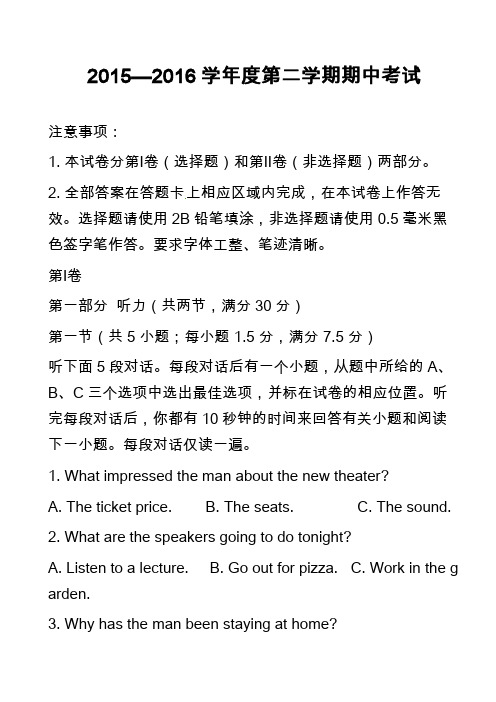
2015—2016学年度第二学期期中考试注意事项:1. 本试卷分第Ⅰ卷(选择题)和第Ⅱ卷(非选择题)两部分。
2. 全部答案在答题卡上相应区域内完成,在本试卷上作答无效。
选择题请使用2B铅笔填涂,非选择题请使用0.5毫米黑色签字笔作答。
要求字体工整、笔迹清晰。
第Ⅰ卷第一部分听力(共两节,满分30分)第一节(共 5 小题;每小题 1.5 分,满分 7.5 分)听下面5段对话。
每段对话后有一个小题,从题中所给的A、B、C三个选项中选出最佳选项,并标在试卷的相应位置。
听完每段对话后,你都有10秒钟的时间来回答有关小题和阅读下一小题。
每段对话仅读一遍。
1. What impressed the man about the new theater?A. The ticket price.B. The seats.C. The sound.2. What are the speakers going to do tonight?A. Listen to a lecture.B. Go out for pizza.C. Work in the g arden.3. Why has the man been staying at home?A. He works at home.B. He is out of work.C. He’s been si ck.4. How many students had planned to take the exam?A. 50.B. 25.C. 15.5. What does the man think of the cheese?A. It is delicious.B. It smells better than it tastes.C. It h as gone bad.第二节(共15 小题;每小题1分,满分22.5分)听下面5段对话或独白。
每段对话或独白后有几个小题,从题中所给的A、B、C三个选项中选出最佳选项,并标在试卷的相应位置。
高中英语真题:2015—2016学年第二学期期中考质量检测

2015—2016学年第二学期期中考质量检测(考试时间:2016年5月11日下午3:15—5:15 满分150分)I.听力理解(20分,每题1分)第一节听下面5段对话。
每段对话后有一个小题,从题中所给的A、B、C三个选项中选出最佳选项,并标在试卷的相应位置。
听完每段对话后,你都有10秒钟的时间来回答有关小题和阅读下一小题。
每段对话仅读一遍。
1. Where will the speakers meet?A. At school.B. At a restaurant.C. At the man’s house.2. At what time does the meeting at the school begin?A. 5:50.B. 6:00.C. 6:15.3. What are the speakers talking about?A. A paper.B. A speech.C. A teacher.4. What will the man do next?A. Get the book.B. Read in the library.C. Read the note.5. What is the woman going to be?A. A doctor.B. A teacher.C. A photographer.第二节听下面5段对话或独白。
每段对话或独白后有几个小题,从题中所给的A、B、C三个选项中选出最佳选项,并标在试卷的相应位置。
听每段对话或独白前,你将有时间阅读各个小题,每小题5秒钟;听完后,各小题给出5秒钟的作答时间。
每段对话或独白读两遍。
听第6段材料,回答第6、7题。
6. What kind of room does the man want to book for his work mate?A. A single room.B. A double room.C. A room for three.7. What does the woman suggest the man do?A. See a show.B. Try another hotel.C. Get in touch with his workmate.听第7段材料,回答第8、9题。
2015-2016学年度第二学期高二期中考试试卷

2015---2016学年度第二学期高二期中考试英语试卷第Ⅰ卷(选择题,共100分)第一部分:单项选择(共30小题,每小题1 分,满分30分)1.He didn’t make_____ clear when and where the meeting would be held.A. thisB. thatC. itD. these2. I have a lot of readings _____before the end of this term.A. completingB. to completeC. completedD. being completed3. It _____me three days _____what I want.A. takes; findingB. pay; findC. spend; findingD. takes ; to find4. Not until he left his home_____ to know how important the family was for him.A. did he beginB. had he begunC. he beganD. he had begun5. Your hard work_____ your great progress in English.A. contributed toB. resulted fromC. depended onD. lied in6. The government is_____ to everyone to save water.A. askingB. appealingC. declaringD. announcing7. Your medical records are strictly _____.A. confidentialB. confidentC. confidentiallyD. confidence8. She remained _____for a while after the movie ended, which made others_____.A. sitting; puzzlingB. sitted; puzzledC. seated; puzzledD. seated; puzzling9. You look well. The air and the sea foods in Sanya must _______you, I suppose.A. agree withB. agree toC. agree onD. agree about10. A clean environment can help the city _____ the Olympics, which in turn will promote its economic development.A. wish forB. long forC. bid forD. stand for11. She has _____a lot of things so she knows exactly how to deal with such a person.A. gone throughB. got throughC. gone byD. gone into12. He has been_____ from his job for carelessness.A. dismissedB. prevented D. discharged D. discouraged13. She was_____ the meeting.A. absent inB. absent-mindedC. absent fromD. absent14. Either you or the headmaster_____ the prize to these gifted students at the meeting.A. is handing outB. are to hand outC. are handing outD. is to hand out\15. Before her stood a terrible man; Linda could do nothing_____.A. but to be cryingB. but cryC. but to cryD. but crying16. He has always insisted that he_____ Dr Turner instead of Mr Turner.A. will be calledB. callC. have been calledD. should be called17. House prices vary from place to place and are usually high_____ there are famous school.A. whereB. sinceC. whenD. whether18.----- I don’t mind how you do it _____you finish the painting on time.----- OK. I see.A. as well asB. as far asC. as long asD. as fast as19. Exhausted _____ she was, she managed to run across the finishing line.A. althoughB. whileC. asD. since20. _____ enough time and money, I’m sure I will do the work perfectly.A. GivenB. GivingC. Having beenD. Having given21. The book will be _____ to students of history.A. of great valueB. of great valuableC. of greatly valueD. of great values22. The news shocked be public, _____to great concern about students’ safety at school.A. having ledB. ledC. leadingD. to lead23. Jack is a great talker. It’s high time that he _____ something instead of just talking.A. will doB. has doneC. doD. should do24. _____ weak we are, we human beings are not completely powerless in natural disasters.A. HoweverB. WhateverC. No matterD. whichever25.Rather than _____ up his marriage, he preferred to tell his wife everything.A. to risk to breakB. to risk breakingC. risk to breakD. risk breaking26. ----The last one_____ pays the meal.----Agreed!A. arrivedB. arrivesC. to arriveD. arriving27. I hear they’ve promoted Tom, but he didn’t mention_____ when we talked on the phone.A. to promoteB. having been promotedC. having promotedD. to be promoted28. The good thing about children is that they _____ very easily to new environments.A. adaptB. adoptC. appealD. apply29. When I saw Jane , I stooped and smiled, but she _____ me, and walked on.A. refusedB. ignoredC. deniedD. missed30. He said he would_____ me to Mr Li as his assistant but he didn’t.A. commentB. suggestC. commandD. recommend第二部分:阅读理解(共两节,满分40分)第一节:(共15小题;每小题2分,共30分)阅读下列短文,从每题所给的ABCD四个选项中选出最佳答案。
- 1、下载文档前请自行甄别文档内容的完整性,平台不提供额外的编辑、内容补充、找答案等附加服务。
- 2、"仅部分预览"的文档,不可在线预览部分如存在完整性等问题,可反馈申请退款(可完整预览的文档不适用该条件!)。
- 3、如文档侵犯您的权益,请联系客服反馈,我们会尽快为您处理(人工客服工作时间:9:00-18:30)。
省市任城区2015-2016学年高二英语下学期期中试题本试卷分第I卷和第II卷两部分,共12页,满分150分。
考试用时120分钟。
第I卷(共100分)第一部分听力(共两节,满分30分)第一节(共5小题;每小题1.5分,满分7.5分)听下面5段对话。
每段对话后有一个小题,从题中所给的A、B、C三个选项中选出最佳选项,并标在试卷的相应位置。
听完每段对话后,你都有10秒的时间来回答有关小题和阅读下一小题。
每段对话仅读一遍。
1. Why is the man complaining?A. Because the table is dirty.B. Because the food is terrible.C. Because the dishes are served slowly.2. Who can talk with the man on the phone during the meeting?A. His wife.B. His dentist.C. The president.3. How does the woman feel now?A. Angry.B. Sorry.C. Nervous.4. When will the speakers meet?A. At 6:00.B. At 6:30.C. At 7:00.5. What can we know from the conversation?A. The man doesn’t want to pay his check.B. The woman is most probably a bank assistant.C. The woman gives the check to the man by mistake.第二节(共15小题;每小题1.5分,满分22.5分)听下面5段对话。
每段对话后有几个小题,从题中所给的A、B、C三个选项中选出最佳选项,并标在试卷的相应位置。
听每段对话前,你将有时间阅读各个小题,每小题5秒钟;听完后,各小题将给出5秒钟的作答时间。
每段对话读两遍。
听第6段材料,回答第6、7题。
6. What will the man do first tonight?A. Go to Dan’s house.B. Eat with some workmates.C. Visit an art museum.7. How will the man get the exact address?A. By checking his s.B. By talking with the woman later on.C. By reading a short message on his cell phone.听第7段材料,回答第8、9题。
8. What are the speakers mainly talking about?A. The man’s teacher.B. The man’s scholarship.C. The man’s mid-term paper.9. Why does the man need to do well?A. He wants to get a scholarship.B. His parents are unhappy with him.C. His teacher has given him a low score.听第8段材料,回答第10至12题。
10. What is the relationship between the speakers?A. Mother and son.B. Teacher and student.C. Husband and wife.11. What can we learn about the man?A. He is successful now.B. He didn’t graduate from college.C. He was always absent in high school.12. What do he speakers decide to do in the end?A. Pay Tom to go to school.B. Take Tom to school every day.C. Make Tom go to school on the school bus.听第9段材料,回答第13至16题。
13. When will the meeting start?A. In half an hour.B. In one hour.C. In two hours.14. What does the man say about the Photography Club?A. They go on a trip twice a month.B. They meet up every Tuesday evening.C. They discuss techniques on the weekends.15. Where did the Photography Club go last week?A. To the mountains.B. To the ocean.C. To a studio.16. What does the man think of the woman’s camera?A. It is too expensive.B. It is better than 7D.C. It isjust fine for her.听第10段材料,回答第17至20题。
17. Where do most European tourists want to go?A. Sunny beaches.B. Big mountains.C. Historic battlefields.18. What is the winter of London like?A. It is rainy.B. It is very bright.C. The days are very short.19. How many people visit Spain every year?A. 30 thousand.B. 13 million.C. 37 million.20. What is the speaker worried about in the end?A. The bad economy.B. The environment.C. The high cost of travel. 第二部分阅读理解(共两节,满分40分)第一节(共15小题;每小题2分,满分30分)阅读下列短文,从每题所给的四个选项(A、B、C、和D)中,选出最佳选项,并在答题卡上将该项涂黑。
ATop walksDo you want to explore some of Cambridge’s most important and interesting places? The following walks will take you on a journey around the city.The walks take place on both Friday and Saturday unless otherwise specified. Please pre-book by visiting: , or by telephoning: 01223 766766.11 am-12:30 pmPioneers of Cambridge scienceMeet outside the Whipple Museum of the History of Science.Cambridge is famous throughout the world for its pioneering achievements in science, including remarkable discoveries in medicine and computing. Science guides will introduce you to the well-known pioneers and significant places within the city.Ages 12+11 am-12:30 pmHistoric CambridgeMeet behind Great St Mary’s ChurchCambridge is well-known for its beautiful buildings and rich history, and is packed with famous names and great achievements. This tour will introduce you to some of the people and places that have made Cambridge the powerhouse it is today.Ages 10+2 pm-3:30 pmCambridge in times of war and peaceMeet behind Great St Mary’s ChurchThe history of Cambridge is closely related to major conflicts such as the War of the Rose, the English Civil War and two World Wars, but Cambridge also has its peace. This walk highlights the people and places associated with two different sides of the Cambridge story.Ages 10+2:30 pm-4 pm SATURDAY ONLYWords carved on stoneMeet behind Great St Mary’s ChurchCambridge is full of wonderful words carved on clocks, memorials and college walls. Some are in English, many in Latin: happy or serious, they are all worthy of attention.Ages 10+21. Which walk will introduce you to medical discoveries?A. Historic Cambridge.B. Words carved on stone.C. Pioneers of Cambridge science.D. Cambridge in times of war and peace.22. When should you take a walk if you are interested in writing on building?A. At 11 am on Friday.B. At 2:30 pm on Friday.C. At 11 am on Saturday.D. At 2:30 pm on Saturday.23. What do the walks have in common?A. They need booking by .B. They take place in the same city.C. They share the same meeting place.D. They are mainly intended for adults.BHow did it make you feel when you learned tha t KFC’S Beijing restaurants pulled three more items from their menus last week? There were fears that the items may have contained the cancer-causing coloring Sudan I. Do you have any desire to take the food provider to court because it feeds you something dangerous?After all, the law supposedly gives people the right to fight for their rights. But some experts have said it might not be so wise to take the company directly to court.Qiu Baochang, a lawyer in Beijing, suggested that consumers not take the company directly to court. “In addition to the high costs,consumers’ complaints are unlikely to win unless they can prove they have had the banned dye (染料) at KFC,”—Qiu explained.One problem for those wanting to take action against the fast food chain is that few customers ask for or keep receipts(收据) . And, this must be the first step.If they can prove that their health has been damaged by KFC, they can accuse the company. But that would be almost impossible to do so because the Sudan I damage is a long-term effect and is not immediately apparent.A KFC spokesperson said on Monday that the company was confident of being able to handle customers’ complaints, “We will obey legal procedure if we r eceive any complaints.”24. Why did KFC’s Beijing res taurants pull three more items from their menus?A. Because the company was afraid to handle customers’ complaints.B. Because coloring Sudan I may have been contained in those items.C. Because the KFC’s restaurants were accused of selling poisonous fo od to the customers.D. Because these items were no longer popular with the customers.25. The reason why experts suggested not taking the company directly to court is that_______.A. the costs will be highB. consumers can’t prove food contained Sudan IC. co nsumers can’t prove the food at KFC damaged their healthD. all of the above26. This passage most probably appears in .A. a notice.B. a book on cooking.C. a story book.D. a newspaper.27. What is the general idea of the passage?A. That K FC’s B eijing restaurants pulled three items from their menus last week.B. How the consumers dealt with the KFC problem.C. How KFC handled the customers’ complaints.D. That consumers never forget to ask for or keep receipts.CFive years ago, David Smith wore an expensive suit to work every day. “I was a clothes addict,” he jokes. “I used to carry a fresh suit to work with me so I could change if my clothes got wrinkled.” Today David wears casual clothes—khaki pants and sports shirt—to the office. He hardly eve r wears a necktie. “I’m working harder than ever,” David says, “and I need to feel comfortable.”More and more companies are allowing their office workers to wear casual clothes to work. In the United States, the change from formal to casual office wear has been gradual. In the early 1990s, many companies allowed their employees to wear casual clothes on Friday, but only on Friday. This became known as “dress-down Friday” or “casual Friday”. “What started out as an extra one-day-a-week benefit for employees has really become an everyday thing.” said business consultant Maisly Jones.Why have so many companies started allowing their employees to wear casual clothes? One reason is that it’s easier for a company to attract new employees if it has a casual dress code. “A lot of young people don’t want to dress up for work,” says the owner of a software company, “so it’s hard to hire people if you have a conservative (保守的) dress code.” Another reason is that people seem happier and more productive when they are wearing comfortable clothes. In a study conducted by Levi Strauss Company, 85 percent of employers said that they believe that casual dress improves employee morale(士气). Only 4 percent of employers said that casual dress has a negative effect on productivity. Supporters of casual office wear also argue that a casual dress code helps them save money. “Suits are expensive, if you have to wear one every day,” one person said. “For the same amount of money, you canbuy a lot more casual clothes.”28. David Smith refers to himself as “a clothes addict,” because __________.A. he often wore khaki pants and a sports shirtB. he couldn’t stand a clean appearanceC. he wanted his clothes to look neat all the timeD. he didn’t want to spend much money on clothes29. David Smith wears casual clothes now, because __________.A. they make him feel at ease when workingB. he cannot afford to buy expensive clothesC. he looks handsome in casual clothesD. he no longer works for any company30. According to this passage, which of the following statements is TRUE?A. Company workers started to dress down every day about twenty years ago.B. Comfortable clothes make employees more productive.C. Dress-down has become an everyday phenomenon since the early 1990s.D. Many workers want to wear casual clothes to impress people.31. In this passage, the following advantages of casual office wear are mentionedexcept __________.A. saving employees’ moneyB. making employees more attractiveC. improving employees’ motivationD. making employees happierDEvery language has its own special words and expressions. And a story can be told about each of them. “Hot” is a simpl e, easily-understood word. So are most of the expressions made with the word “hot”. But not always, as we shall see.Take the phrase “hot potato” for example. The potato is a popular vegetable in the United States. Many people like baked potatoes, cooked in an oven or fire. Imagine trying to carry a hot, baked potato in your hand. It would be difficult, even painful, to do so. One such hot potato is taxes. Calling for higher taxes can mean defeat for a politician. And yet, if taxes are not raised, some very popular government programs could be cut, which can also make a politician very unpopular.Another expression is “not so hot”. If you ask someone how she feels, she may answer: “Not so hot.” What she means is that she does not feel well. “Not so hot”is also a way of saying that you do not really like something.“A hot shot” is a person, often a young person, who thinks he can do anything. At least he wants to try. He is very sure he can succeed. But often he fails. The expression came from the army. A hot shot was a soldier who fired without aiming carefully.A person who becomes angry easily is called “a hothead”. An angry person’s neck often becomes red. We say he is “hot under the collar”. You could say that your friend is no hothead. But he got hot under the collar when someone took his radio.The hot line was a direct communication link between the leaders of the Soviet Union and the United States. The hot line had an important purpose: to prevent accidental war between the two competitors during the period known as the Cold War. The American president and the Soviet leader were able to communicate directly and immediately on the hot line.32. If you describe something as a hot potato, it _____.A. is very popularB. has a high temperatureC. is very difficult to deal withD. can’t be held in your hand33. According to the text, which of the following statements is NOT true?A. All of the expressions made with the word hot are simple, easily-understood.B. Taxes can be a hot potato for a politician if not handled carefully.C. The expression “a hot shot” was born in the army.D. If you say that the new play you saw last night is not so hot, you do not consider it asuccess.34. “Hot” is a word that is often used to talk about anger, which two phrase s are associated with this meaning?A. a hot shot, a hot potatoB. a hothead, a hot shotC. hot under the collar, a hotheadD. a hot potato, hot under the collar35. The purpose of the first hot line was _____.A. to stop the Cold WarB. to prevent accidental war between the two superpowersC. to promote the cooperation between the Soviet Union and the United StatesD. to make direct telephone links for the people in Moscow and Washington第二节(共5小题,每小题2分,满分10分)根据短文容,从短文后的选项中选出能填入空白处的最佳选项,选项中有两项为多余选项。
